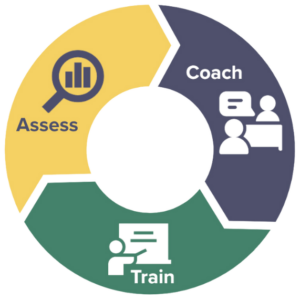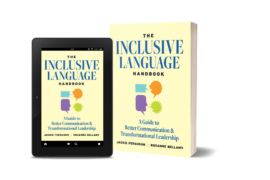With all the DEI strategies, initiatives, and publications that focus on understanding and supporting underrepresented employees, there still seems to be not enough talk or representation of that one elephant in the room — the one whose experience not only relates to ethnic, racial, or cultural marginalization but also of being raised within a totally un-American background. That elephant is The Foreigner.
Who is The Foreigner?
The Foreigner can be any colleague, employee, or business leader who comes from a different national origin and, therefore, does not align with the dominant culture of your organization’s employees. Even if your organization has an impressively diverse, equitable, inclusive environment of people from different backgrounds, it’s highly likely that the vast majority were born and raised in the United States.
In diverse cities such as New York, L.A., Atlanta, Chicago, and Washington D.C., there is a plethora of professionals who come from immigrant backgrounds and have lived personal and professional experiences abroad, before ever setting foot into the U.S.. Others may have been born and raised in culturally strong households in the U.S. where the values, customs, and principles of their home country were dominant or pervasive and have therefore influenced their behavior and their way of thinking.
An Immigrant’s Experience in the Workplace
On August 4, 2020, when the great explosion shook the Beirut port in Lebanon, I was working from home for a global translation company in my apartment in Brooklyn. Hearing that terrible news and seeing all those tragic videos and photos, I was shaken. I knew I could not continue working. So, I told my colleagues and my direct manager that I needed the next hours and the next day off of work, and I did my best to hand off each piece of my work.
Two days later, my supervisor called and pretended to be empathetic for a moment, but then dove into a harsh denunciation about how I had handed off my projects and seemingly neglected my work. Their insensitive response affected me deeply and showed me that there would be little appreciation or empathy for my immigrant experience, nor any value placed on my foreigner’s sentiments.
That experience helped me realize the need for education and for actionable guides that could teach American employees how to navigate and value their co-workers who come from different countries around the world, taking into consideration their cultures, customs, behaviors, perceptions, values, and assimilation to a company’s–and country’s–culture.
As part of Global Diversity Awareness Month, I’d like to share with you some simple steps for establishing healthy relationships with foreign colleagues and becoming allies to the immigrant experience:
1) Acknowledge the Difference and the Unfamiliar Experience
Put first things first. Specifically for hiring managers and direct supervisors, you must acknowledge the fact that your foreign colleagues have different lived experiences from the majority of your employees. Name the elephant in the room but do so respectfully and with the intention to be inclusive. Their values, beliefs, reactions, accents, and expressions may not be the same as yours, and that is okay. In fact, it’s good for business because diverse people have diverse perspectives, leading to better problem solving, greater innovation, and stronger decision making across your organization. Remember, every person is different, so you cannot expect everyone to think, behave, or go about a project the same way you do — or even the same way that the majority of your employees do.
2) Be Patient, Observant, and Attentive
Sometimes, it can be challenging to “speak the same language” as The Foreigner. After acknowledging the fact that your colleagues may have different accents, behaviors, and verbal expressions that are not familiar to you, try to avoid any assumptions of negative behavior from their end, and also avoid showing frustration or confusion about their communication style. Instead, take your time to observe their behavior. Instead of jumping to conclusions, try to pinpoint the exact expressions, body language, or messages that you resonate with. Assume each person’s positive intent.
For example, imagine you are having a casual conversation with your colleague who is originally from Mumbai, India, and throughout the conversation they say “I passed out in 2018 from my college.” The first thing that may come to your mind is “Pass out? What do they mean by that?” This moment of confusion shows on your face and makes your colleague feel immediately uncomfortable. They feel like maybe they said something wrong.
To avoid this conflicting interaction, take a moment and try to understand what your colleague might mean. The simplest way to figure it out? Just ask. Ask what they mean in a conversationally constructive and respectful way, such as by saying: “What do you mean by ‘pass out’? I use that term to mean fainting, but you seem to mean something else.” Or, “When you say ‘pass out,’ do you mean ‘graduated’? Thank you for teaching me a new expression. This is great!”
3) Listen to Their Experience and Show Genuine Interest
A few months ago, as thousands of Haitian migrants were coming across U.S. borders, many were mistreated by the U.S. Border Patrol and, often, sent back to their homes in Haiti, even if they had not lived in Haiti for years. Social media platforms, including professional ones such as LinkedIn, have since been flooded with triggering visuals of the incident. For many Americans, this news may have been just another blip as they scrolled through their social media feed. But, consider what this event might have meant to a Haitian colleague or South American immigrant.
This experience may not relate to you personally, but if you know a colleague who comes from Haiti, it could make a world of difference if you take the time to check in on them personally, and listen to their reactions about this incident.
Moments of cultural awareness like this provide a great opportunity for relationship building and for you to lend a sympathetic ear to your colleague’s experience and cultural upbringing. To act as an ally, show your interest in their story as humans who come from another part of the world, and ask how they are navigating this new space and place. Not only will your conversation provide them a sense of comfort and belonging, but it will also affect their attitude, productivity, and performance in the workplace.
4) Use the DAJA Approach: Don’t Assume. Just Ask!
In order to mitigate our natural, unconscious biases, it is best not to assume certain things about your colleagues just because they come from a certain culture of which you have pre-existing views. For instance, if your colleague is from the Middle East and they mention in a casual conversation how much they love eating bacon, but that surprises you because you heard that Muslims don’t eat pork, you should avoid expressing your surprise and simply keep the thought to yourself.
Instead of commenting on what you thought was true, just respond by showing interest, as per point 3, and maybe ask more about your colleague’s food interest and how they might relate back to their culture. For instance, try asking: “What was your favorite food when you were a child?” or “Do you cook Middle Eastern food every now and then?” And, if the conversation naturally flows into your colleague’s narration of their cultural upbringing, make sure to welcome what you are learning, and tell them you appreciate their sharing.
Even for people who champion inclusion and want to be inclusive colleagues or allies, cultural barriers are always a challenge in the workplace. The more you make yourself open to conversation and understand the value of the common interests you have with your foreign colleagues, the healthier relationship you will both have and the more of an ally you can become.
And, if you’re the leader of an organization that wants to reap the benefits of inclusion, teaching your employees critical skills for cross-cultural interaction should be a critical focus of your DEI strategy. After all, it isn’t only awareness that makes us better colleagues and coworkers; it’s knowing the right things to say and do in situations we’ve never experienced before.
Jad is a multilingual Media & Communications professional and educator with global experience in creative agencies in the Middle East, North African and North American regions with extensive skill sets in film production, creative marketing strategies, DEI, and learning and development.














